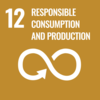The university catering team has embedded sustainability into the core of its strategy, striving to reduce the environmental impact of operations, committing to future change, and measuring the impact of positive initiatives.
Engagement with staff and students has enabled the catering offering to continually improve in an environmentally conscious way. The team have drastically reduced their food waste in both kitchen operations and packaged food by changing their working practices. Engagement with suppliers has helped to reduce plastic packaging and associated emissions, and the development of a 20-mile menu has meant an enormous transformation in catering contracts to use local suppliers. The team is committed to growing change, by installing their own herb and vegetable garden, enabling the development of a seasonal menu that changes with the produce ready to harvest.
Continual improvement is the underlying principle of all decisions, finding innovative ways to reduce their environmental impact and source in an environmentally and ethically conscious manner.
The approach is complete, clearly demonstrating engagement with staff and students. The 20-mile menu and the own on-site vegetable beds initiatives are particularly impressive, engaging everyone with healthy-eating and sustainability. There has been clear social impact with the Too Good to Go initiative, as well as cooking classes and so on. ‘From Our Veg Patch To Your Plate’ is a fantastic USP.
The work with SUSU to integrate students into the changes is commendable and should be a model for all. Steps like the electric fleet and a <10% beef offering are welcomed for environmental change, and a phenomenal effort with more sustainable packaging options.
"Our vision is to embed sustainability into everything we do, and our catering team have demonstrated how effectively this can be done. Winning this award provides well-deserved recognition, celebrating their achievements, encouraging a continued focus on sustainability and helping change habits across our university community to reduce our environmental impact."
Professor Mark E. Smith, President and Vice-Chancellor
